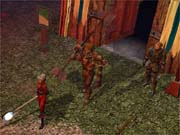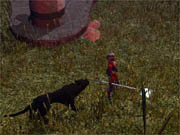Neverwinter Nights Q&A
We discuss the future of Neverwinter Nights, and of RPGs in general, with Ray Muzyka and Greg Zeschuk of BioWare.
What more can possibly be said about BioWare's Neverwinter Nights? This remarkable role-playing game was first announced almost three full years ago (and has been in development for even longer than that), and it has since become one of the most highly anticipated role-playing games ever. Neverwinter Nights will be the spiritual successor to SSI's cult-classic online game of the same name, which used Stormfront Studios' gold-box game engine and ran on America Online for about seven years. But Neverwinter Nights is going to have a lot more going for it than a pretty cardboard box--it'll also have a sizeable single-player campaign, online multiplayer play, a dungeon master mode that will let you host your own online sessions, and a powerful, versatile toolkit that will let industrious dungeon masters create their own adventures, monsters, and items. It'll also make use of Wizards of the Coasts' updated 3rd Edition Dungeons & Dragons rules, which give players a lot of interesting new options to create and design distinctive characters, especially with the inclusion of heroic feats--special abilities that let players improve the power of their magic spells, perform all sorts of devastating maneuvers in hand-to-hand combat, and much, much more.

But you probably already knew that. After all, Neverwinter Nights has consistently been one of the most talked-about games these past few years. Early on, much of that talk consisted of questions--questions about whether or not such an ambitious project was even possible, even for BioWare, the creator of the Baldur's Gate games, which many fans consider to be the quintessential role-playing game series. But in the past year or so, we've really seen Neverwinter Nights come together, no longer as a collection of lofty ideas, but as a very real (and very playable) game.
But once Neverwinter Nights finally hits store shelves, will that be it? Will BioWare be content to sit back and rest on its laurels, while the game's devoted fan community does all the work of creating new adventures? And what effect will this undoubtedly influential game have on role-playing games in general? We put these questions to BioWare's joint CEOs, Greg Zeschuk and Ray Muzyka.
GameSpot: Thanks for taking the time for this interview. Could you discuss your roles in the development of Neverwinter Nights? What specific things is each of you working on right now?
Ray Muzyka: Greg and I are joint CEOs of BioWare, and also co-executive producers on all of our projects here. As such, we try to help Trent Oster, the project director and producer on Neverwinter here at BioWare, and the rest of the development team out in any way we can--testing the game, providing suggestions on functionality, and helping coordinate with our publisher, Infogrames. The team on Neverwinter is very talented, smart, and creative, and everyone is working very hard to get the game done at a high standard of quality."The overall scope of Neverwinter is probably the most challenging aspect of [developing] the game."--Dr. Ray Muzyka, BioWare joint CEO
GS: Now that Neverwinter Nights' development is finally complete, would you say that the game has turned out more or less the way you wanted it to? What's been the most difficult thing about creating it? Has there been a single feature that's been most challenging to implement?
RM: The overall scope of Neverwinter is probably the most challenging aspect of [developing] the game--there is just so much content there, and so many features. All told, we have put about 160 man-years of development work into the game. Playing the single-player game through from start to finish takes about 140 hours or more if you try to do everything (that's how long it took me, in any event). The four pillars of the game--single-player, multiplayer, the module creation toolset, and the dungeon master tools--all represent significant challenges in their own right.
So, What Happens Now?

GS: Conversely, what would you say you've been most successful with? Is there a single feature in Neverwinter Nights, or an aspect of the game's development, that you're most proud of?
RM: I personally really enjoyed the single-player part of the game--the storyline was quite fun, and several dungeons really stood out as being particularly memorable. Playing the game in multiplayer mode is also amazing. We made a simple player vs. player module--kind of a Counter-Strike type of module--that a few of us were playing through yesterday, and we really enjoyed it.
GS: We know the game will have tremendous support from the player community. Players will use the editing tools to create their own custom items, dungeons, and adventures. But what can we expect to see from BioWare after the game finally ships? Are there plans to continually produce new content for the game after it comes out?
RM: Indeed there are! We've put in place a community, or "live" team, for the game and have definite plans to continue to support it post-release with new content and features. We want to see what the fans of the game are most interested in, and we will be focusing our development efforts in those directions.
GS: What are your own plans for Neverwinter Nights after release? Where do you see the game in a year? Two years? Any thoughts on a commercial expansion pack, or even a sequel?
Greg Zeschuk: Our plans for Neverwinter post-release will be based on the response of the players of the game. We are designing systems to determine which modules people like to play, and then we will base our future development on that information. After a year, we imagine we'll have hundreds of really good fan-created modules in a variety of categories. We also expect to have a handful of amazing modules made by either fans or independent groups that everyone will have to play.
GS: Looking back, how would you describe your experience working with the 3rd Edition Dungeons & Dragons rules, and with the Forgotten Realms universe in general?
GZ: The 3rd Edition Dungeons & Dragons rules are more complex than the 2nd Edition rules, but this cost comes with a great benefit to the customizability of characters and depth of the game. Thanks to the skills and feats in the 3rd Edition rules, characters can be totally customized--classes are still important, but there's much more variety available within a class. There are more complex game systems in Neverwinter Nights than in the Baldur's Gate series, but it's also a considerably more versatile game.
We like the Forgotten Realms--even though it's the most commonly used D&D world, there's still lots you can do with it.
GS: Are there other settings--such as Dragonlance, Ravenloft, Dark Sun, or Planescape--that you might want to explore as a possible setting for a future add-on or new game? Would you ever consider revisiting Baldur's Gate? Or is it time to give D&D a break?
RM: We'd have to discuss that sort of thing with our publisher, Infogrames, and the ultimate licenser of the Dungeons & Dragons rules, Wizards of the Coast, since these rights are ultimately held by WOTC and by Infogrames (for computer games).
The Future of Role-Playing Games?
GS: We firmly believe that Neverwinter Nights has the potential to change computer role-playing games forever. No, seriously. We do. What are your thoughts on the state of role-playing games today? What sort of effect are you hoping Neverwinter Nights will have on the way people make electronic role-playing games and how they think about them?
GZ: I think role-playing games are experiencing a significant renaissance. In the last three months, we've seen the release of some really great and divergent RPGs. Dungeon Siege was a tremendously well-executed and fun action-oriented RPG. It's also been a clear commercial success. Morrowind has an absolutely gorgeous and expansive world to explore. It sets a new standard for nonlinear adventuring. Neverwinter Nights should make people happy with its campaign and the variety of ways in which it can be played and enjoyed in both single- and multiplayer. One of the most interesting common aspects of these games is that they are all providing tools to the users to create their own content. This relatively new concept will have a huge impact on how people consider RPGs in the future.

We think the impact of Neverwinter Nights will be considerable. I can probably illustrate it best by describing something that happened recently on the team. A few of the guys in the office had been working on a player vs. player module, and we started testing it in the late evening after working all day (remember, this happened after a very long haul for the team working on the project). After "testing" for a few hours, we made some revisions and then played some more. Each time we took it down and put it back up with revisions, more people would join in. After starting with a handful of people testing, we ended up with 16 people all itching the play the latest revision--and this was at 1:00am and on a weekend when everyone should have been at home sleeping. Instead they all wanted to play a module that we'd been whipping up for a quick test. At that point, we were pretty sure we had something special.
GS: One of the most ambitious and interesting features of Neverwinter Nights is its dungeon master mode, and how it just might be the closest thing to holding a pen-and-paper game session on a computer. How do you think hard-core tabletop RPG fans will receive Neverwinter Nights? What sort of effect, if any, do you think Neverwinter Nights might have on tabletop role-playing games in general?
RM: I think we hope that Neverwinter will get people more interested in pen-and-paper role-playing, actually, as well as capture the interest of existing pen-and-paper role-playing fans who want to play the truest computer adaptation of D&D ever made. Many computer game fans who otherwise might never get to play pen-and-paper D&D will be introduced to it through Neverwinter.
GS: Finally, is there anything else you'd like to add about Neverwinter Nights?
RM: Everyone here, even though exhausted by many recent 16-hour workdays as we try to finish up the game, is still exhilarated by the potential of Neverwinter. I personally can't wait to see what our end users will manage to create using the BioWare Aurora Neverwinter Toolset, and we all look forward to playing through their adventures ourselves both in single-player and multiplayer. We all hope that our fans will really like the epic campaign that we're shipping with the game--there are a couple of dungeons in the campaign that I think are the best we've ever done as a company, and the overall story arc really compels you to play. Finally, multiplayer is a blast--both the cooperative and the competitive modules are really easy to get into, and as much fun as any multiplayer games I've ever played!"Role-playing games are experiencing a significant renaissance."--Dr. Greg Zeschuk, BioWare joint CEO
GS: We can't wait to play it ourselves. Thanks, Ray and Greg.
Got a news tip or want to contact us directly? Email news@gamespot.com
Join the conversation